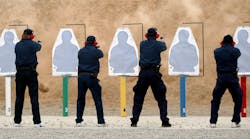Deputy director says FLETC future bright in Brunswick
William Fallon understands the important role played by the Federal Law Enforcement Training Center in national defense.
As deputy director of the training center in Brunswick, he is one of the people responsible for coordinating training for federal workers from more than 90 federal agencies this year.
The longest training sessions can last as long as 26 weeks for Internal Revenue Service workers to study criminal investigations that are growing more complicated because of constantly evolving technologies. But the biggest demand for training is from customs and border agents.
Fallon explained at a St. Simons Island Rotary Club meeting on Tuesday how the training center has evolved over time to now be under the umbrella of the Department of Homeland Security.
The center’s mission statement says its role is to prepare “the federal law enforcement community to safeguard the American people, our homeland and our values.”
Fallon said the training center is world renowned with no comparison. At any given time, the center has as many as 3,000 employees and anywhere from 2,500 to 3,000 students training.
“This year we’ve been busy,” he said.
The training center’s dormitories are always full, forcing students and some instructors to live off campus in rental homes and motel rooms as far away as Waycross and Jacksonville, Fla. Fallon estimates the center will spend nearly $13 million this year to house students and instructors off campus.
The center is still recovering from flood damage by Hurricane Matthew, where the bottom floor of two dormitories had three feet of water after the storm, affecting operations for several months. When Hurricane Irma struck a year later, Fallon said the center was better prepared and was operating a week after the storm.
He discussed the dangers of the job by some of the people trained at the center, adding he has experienced the loss of a coworker firsthand. Fallon said he had to visit the family of a former partner after he was killed in the line of duty.
He also chronicled some of the other high-profile incidents in which workers trained at the center have lost their lives, including four ATF investigators in 1993 in Waco, Tex., eight federal employees who died in 1995 in the Oklahoma City bombing, and the Sept. 11, 2001, terrorist attacks that Fallon said “changed the nation.”
“They get put into high risk assignments in high risk areas,” he said. “They do have a difficult job.”
Now, many of the first responders from the 9/11 attack in New York City are dying from cancer, he said.
Another concern is the growing number of active shooter cases.
“The tactics changed after Columbine,” he said, referring to the mass shooting in 1999 at a high school in Colorado.
Most recently, officials from FLETC met with law enforcement officials from Las Vegas to learn what lessons were learned from the 2017 mass shooting in which 58 people were killed and another 422 were wounded.
The good news is Fallon said the center in Brunswick had its best year of federal funding in nearly two decades. The extra funding will be used to build more housing at the center. He predicted the center will continue to have a long presence in Brunswick.
“We’re not going anywhere,” he said. “If anything, we’ll be bigger and better.”
———
©2019 The Brunswick News (Brunswick, Ga.)
Visit The Brunswick News (Brunswick, Ga.) at www.thebrunswicknews.com
Distributed by Tribune Content Agency, LLC.
